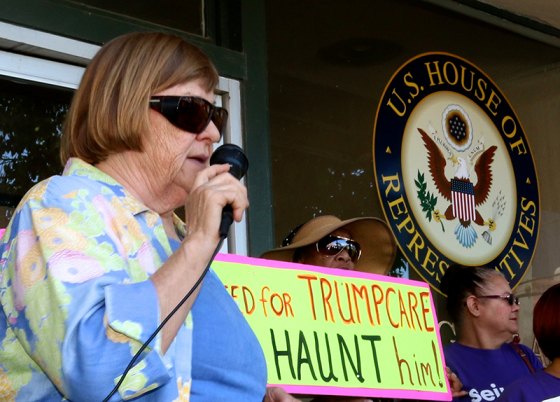No luck as local protesters take another shot at meeting with Representative Valadao
In none of the protests has Valadao spoken to the group, nor has he held a town hall meeting in the district.
According to officials at the scene Thursday morning, 25-30 protesters picketed and spoke out at the congressman’s office. Once again, he did not respond locally to the group.
Protesters included members of the group Indivisible, Planned Parenthood, the Service Employees International Union (SEIU), and the Jimmy Carter Club, a local Democratic organization.
Hanford's Jacqueline Lowe spoke to the group during the protest. She told The Leader that the ongoing health care dispute was the prime topic of protest Thursday morning, and members were urging Valadao to act responsibly.
“We would like to plead with him (Valadao) one more time to vote against the Republican bill – or Trumpcare,” pleaded Lowe, a retired child care services administrator and teacher.
In an earlier statement regarding the American Health Care Act (AHCA), which he voted for, along with a bare majority of Republican congressmen, Valadao voted for it, where it has since languished in the U.S. Senate and is expected to die a quick death.
“Obamacare is failing,” said Valadao in a statement. “Under the law, our Central Valley communities were prevented from recruiting medical professionals, our emergency rooms were overflowing, and parents were unable to choose the best health-care options for their children. As a parent, there is absolutely nothing more important to me than ensuring families have access to quality, affordable health insurance.”
While he voted for the AHCA, he cautioned that Congress must “provide robust support for our safety-net programs, like Medicaid, so they can continue to ensure access to health care for all Americans.”
He added that “Medicare is a promise the government has made to the American people and I do not support any changes to benefits for current beneficiaries and near retirees. However, we must reform Medicare to ensure we can keep its promise for generations to come.”
The Senate’s version of health care reform seems to be dying a slow death as well, as several Republican senators have come out against the proposed new law, which many Republicans are referring to as “Obamacare Lite.”
“It was the health care issue,” confirmed Lowe when asked the reason for the protest. “I think they’re (Congress) going to rush this bill so no one will be able to comment on it. Some 20,000 persons (in Kings County) could lose health care if the House version passes.”
There may be some hope for concerned citizens like Lowe. Senate Majority Leader Mitch McConnell is having difficulty rounding up the required votes to pass the Senate’s version of health care, and he has indicated that he may be willing to work with Senate Democrats to “fix” the system rather than repeal it.
Lowe insisted that children, people with disabilities or with pre-existing conditions, Planned Parenthood users, will all lose if the Republican version of health care passes. “Despite many pleas, he (Valadao) does not want to meet with us to discuss the issue,” said a disappointed Lowe.
She’s also concerned about the effect that replacing Obamacare with a more stringent Republican version might have on the nation’s economy. After all, health care represents about one-sixth of the economy and “taking money out of the system will have a ripple effect,” she said.
Hospitals will be hit hard, emergency rooms will be packed, health care will be more costly and rural clinics and hospitals will certainly feel the financial strain.
Seeking History
- Local congressman, with Republican help, gets language in Senate veterans' bill
- Local congressman, TJ Cox, releases 2020 mid-year report of district accomplishments
- Local Rep. TJ Cox joins California delegation in urging USDA to help feed seniors
- Rep. TJ Cox introduces bipartisan bill to confront threat of methamphetamines
- Congressman Cox secures federal funding for under served communities in Central Valley
- Local officials sign letter urging next COVID-19 aid package includes funding for local government
_0.jpg)

.jpg)




